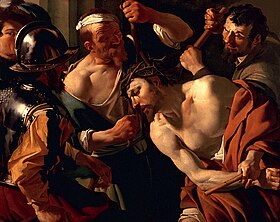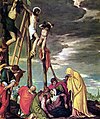Talk:Jesus, King of the Jews/MergedVersion

In the New Testament, Jesus is referred to as the King of the Jews both at the beginning of his life and one at the end.
Both uses of the title lead to dramatic results in the New Testament accounts. In the account of the Nativity of Jesus in the Gospel of Matthew, the three wise men (i.e. Magi) who come from the east call Jesus the "King of the Jews", causing King Herod to order the Massacre of the Innocents. In the accounts of the Passion of Jesus in all four Canonical Gospels, the use of the "King of the Jews" title leads to charges against Jesus that result in his Crucifixion.[1][2]
In the New testament, the "King of the Jews” title is used only by the gentiles, namely by the Magi, Pontius Pilate and the Roman soldiers. In contrast the Jewish leaders use the designation "King of Israel".[1] The phrase has also been translated King of the Judeans (see Ioudaioi).
Use in the Nativity
[edit]In the account of the Nativity of Jesus in the Gospel of Matthew the Biblical Magi go to see King Herod the Great in Jerusalem and in Matthew 2:2 ask him: "Where is he that is born King of the Jews?"[3]
The question troubles Herod who considers the title his own, and in Matthew 2:7-8 he attempts to trick the Magi to reveal the location of the newborn King of the Jews. However, once the Magi depart without informing Herod of the location of Jesus, Herod orders the execution of all young male children in the village of Bethlehem, in the episode known as the Massacre of the Innocents (Matthew 2:16) to avoid the loss of his throne to the newborn King of the Jews whose birth had been announced to him by the Magi.[4][3]
Use in the Passion
[edit]In the accounts of the Passion of Jesus, the title King of the Jews is used on three separate occasions. In the first such episode, all four Gospels state that the title was used for Jesus when he was interviewed by Pilate and that his Crucifixion was based on that charge, as in Matthew 27:11, Mark 15:2, Luke 23:3 and John 18:33.[5]

The use of the terms King and Kingdom, and the role of the Jews in using the term King to accuse Jesus are central in the discussion between Jesus and Pilate. In John 18:34 Jesus hints that the King accusation did not originate with Pilate but with "others" and in John 18:36 he states: "My kingdom is not of this world". However Jesus does not directly deny being the King of the Jews.[6][7]
In the New Testament, Pilate writes "Jesus of Nazareth, King of the Jews" as a sign to be affixed to the cross of Jesus. John 19:20 states that the Jews told Pilate: "Do not write King of the Jews" but instead write that Jesus had just claimed that title, but Pilate wrote it anyway.[8]
After the trial by Pilate and after the Flagellation of Christ episode, the soldiers mock Jesus as the King of Jews by putting a purple robe (that signifies royal status) on him, place a Crown of Thorns on his head, and beat and mistreat him in Matthew 27:29-30, Mark 15:17-19 and John 19:2-3.[9]
The continued reliance on the use of the term King by the Jews to press charges against Jesus is a key element of the final decision to crucify him.[2] In John 19:12 Pilate seeks to release Jesus, but the Jews object, saying: "If thou release this man, thou art not Caesar's friend: every one that maketh himself a king speaketh against Caesar" bringing the power of Caesar to the forefront of the discussion.[2] In John 19:12 the Jews then cry out: "Crucify him! ... We have no king but Caesar."
The use of the term "King of the Jews" by the early Church after the death of Jesus was thus not without risk, for this term could have opened them to prosecution as followers of Jesus, who was accused of possible rebellion against Rome.[2]
The final use of the title only appears in Luke 23:36-37. Here, after Jesus has carried the cross to Calvary and has been nailed to the cross, the soldiers look up on him on the cross, mock him, offer him vinegar and say: "If thou art the King of the Jews, save thyself." In the parallel account in Matthew 27:42 the Jewish priests mock Jesus as "King of Israel", saying: "He is the King of Israel; let him now come down from the cross, and we will believe on him."
King of the Jews vs King of Israel
[edit]In the New testament, the "King of the Jews” title is used only by the gentiles, namely by the Magi, Pontius Pilate, Roman soldiers. In contrast the Jewish leaders prefer the designation "King of Israel", as in Matthew 27:42, Mark 15:32. But from Pilate's perspective, it is the term "King" (regardless of Jews or Israel) which is sensitive, for it implies possible rebellion against the Roman Empire.[1]
In the Gospel of Mark the distinction between King of the Jews and King of Israel is made consciously, setting apart the two uses of the term by the Jews and the gentiles.[10]
The INRI and INBI acronyms
[edit]
The acronym INRI represents the Latin inscription IESVS·NAZARENVS·REX·IVDÆORVM (Iesus Nazarenus, Rex Iudaeorum), in English reads as "Jesus the Nazarene, King of the Jews".[11] John 19:20 states that this was written in three languages: Hebrew, Latin and Greek.[12] The Greek version reads INBI.[12]
Devotional enthusiasm greeted the discovery by Cardinal Pedro González de Mendoza in 1492 of what was acclaimed as the actual tablet, said to have been brought to Rome by Saint Helena, mother of Emperor Constantine.[13]
Western and Eastern Christianity
[edit]In the Western Church, most crucifixes and many depictions of the crucifixion of Jesus include a plaque or parchment placed above his head, called a titulus, or title, bearing only the Latin letters INRI, occasionally carved directly into the cross and usually just above the head of Jesus. In the Eastern Church "King of Glory" (τῆς Δόξης) may be used.[12][14]
In the East (both Eastern Catholics and Eastern Orthodox) use the Greek letters INBI, based on the Greek version of the inscription, Ἰησοῦς ὁ Ναζωραῖος ὁ βασιλεὺς τῶν Ἰουδαίων. Some representations change the title to "ΙΝΒΚ" ὁ Bασιλεὺς τοῦ κόσμου ("The King of the World"), or to ὁ Bασιλεὺς τῆς Δόξης ("The King of Glory"), not implying that this was really what was written but reflecting the tradition that icons depict the spiritual reality rather than the physical reality. Some other Eastern Orthodox churches (such as the Romanian Orthodox Church) use the Latin version, INRI, which is the same to the abbreviation of the Romanian equivalent. The Russian Orthodox Church uses ІНЦІ (the Church Slavonic equivalent of INBI) or the abbreviation Царь Славы ("King of Glory").
Versions
[edit]| Mark | Luke | Matthew | John | |
|---|---|---|---|---|
| Verse | Mk 15:26 | Lk 23:38 | Mt 27:37 | Jn 19:19-20 |
| Greek Inscription | ὁ βασιλεὺς τῶν Ἰουδαίων | ὁ βασιλεὺς τῶν Ἰουδαίων οὗτος | οὗτός ἐστιν Ἰησοῦς ὁ βασιλεὺς τῶν Ἰουδαίων | Ἰησοῦς ὁ Ναζωραῖος ὁ βασιλεὺς τῶν Ἰουδαίων |
| English translation | The King of the Jews | This is the King of the Jews | This is Jesus, the King of the Jews | Jesus of Nazareth, the King of the Jews |
| Languages | [none specified] | Hebrew, Latin, Greek | [none specified] | Hebrew, Latin, Greek |
| Full verse in KJV | And the superscription of His accusation was written over, THE KING OF THE JEWS. | And a superscription also was written over Him in letters of Greek, and Latin, and Hebrew, THIS IS THE KING OF THE JEWS. | And set up over His head His accusation written, THIS IS JESUS THE KING OF THE JEWS | And Pilate wrote a title, and put it on the cross. And the writing was JESUS OF NAZARETH THE KING OF THE JEWS. |
Gallery
[edit]Biblical scenes
[edit]-
The Magi visit Herod to ask about the newborn King of the Jews, Matthew 2:2
-
Pilate, trying and handing over Jesus, the King of the Jews, Mark 15:2
-
Jesus with a royal purple robe mocked and beaten as the King of the Jews, John 19:2-3.
-
Jesus, on the cross, is mocked in Calvary as the King of the Jews, Luke 23:36-37
INRI examples
[edit]-
INRI plaque attached to Crucifix and Calvary statue on the north side of Charles Bridge, Prague
See also
[edit]References
[edit]- ^ a b c The Gospel of Matthew by R. T. France 2007 ISBN 080282501X page 1048
- ^ a b c d Studies in Early Christology by Martin Hengel 2004 ISBN 0567042804 page 46
- ^ a b The Gospel of Matthew by R. T. France 2007 ISBN 080282501X pages 43 and 83
- ^ Jesus and the Gospels: An Introduction and Survey by Craig L. Blomberg 2009 ISBN 0805444823 page 244
- ^ Introduction to the New Testament Christology by Raymond E. Brown, 1994 ISBN 0826471900 pages 78-79
- ^ The Names of Jesus by Stephen J. Binz 2004 ISBN 1585953156 pages 81-82
- ^ John by H. A. Ironside 2006 ISBN 0825429153 page 454
- ^ The Gospel and Epistles of John by Raymond Edward Brown 1988 ISBN 0814612830 page 93
- ^ The Passion of Jesus in the Gospel of Matthew by Donald Senior 1985 ISBN 0894534602 page 124
- ^ Theology of the New Testament by Georg Strecker, Friedrich Wilhelm Horn 2000 ISBN 0664223362 pages 375-376
- ^ Arthur de Bles, 2004 How to Distinguish the Saints in Art by Their Costumes, Symbols and Attributes ISBN 141790870X page 32
- ^ a b c Metamorphosis: the Transfiguration in Byzantine theology and iconography by Andreas Andreopoulos 2005 ISBN 0881412953 page 26
- ^ Roberto Lanciani, Storia degli scavi di Roma, vol. i, 79, noted by Roberto Weiss, The Renaissance Discovery of Classical Antiquity 1969:102.
- ^ The Incarnate God: The Feasts of Jesus Christ by Catherine Aslanoff 2005 ISBN 0881411302 page 124






